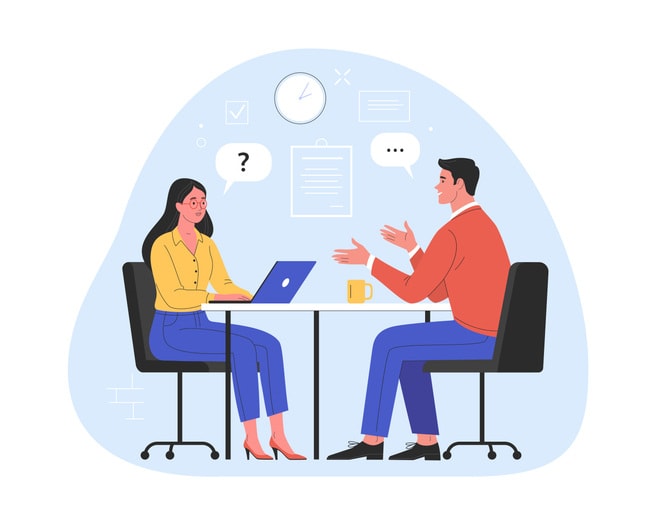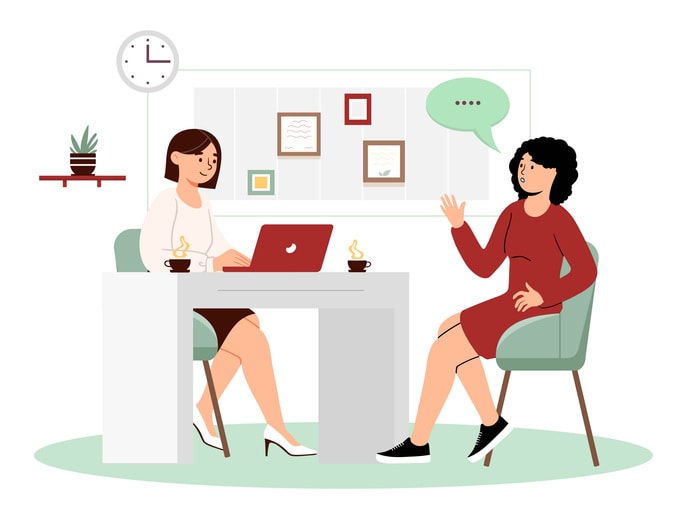When facing the greatest weakness interview question, you’re expected to strike a delicate balance: reveal a genuine area for improvement without casting doubt on your suitability for the role. The "what is your greatest weakness" interview question is designed to gauge your self-awareness and commitment to professional growth. This article provides direct, practical steps on how to answer the greatest weakness question, offering strategies to choose a weakness that showcases your honesty and potential, along with tips on how to discuss your improvement efforts effectively.
Key takeaways
- The ‘Greatest Weakness’ interview question allows candidates to demonstrate self-awareness, honesty, and the ability to grow. An effective answer should show a genuine weakness alongside efforts to improve.
- A strategic response to the weakness question includes a balanced admission of a genuine weakness, proactive steps taken toward improvement, and its relevance to the job requirements while being concise and confident.
- Long-term strategies for addressing weaknesses include a commitment to continuous learning and establishing clear SMART goals with managers, which shows dedication to personal and professional development beyond the interview process.
Understanding the 'greatest weakness' interview question

It is likely we have all been through many career interviews, and no matter how much preparation, the ‘What’s your biggest weakness?’ question can still hit like a right hook.
The ‘Greatest Weakness’ question is more than just a tricky hurdle for applicants. It’s a tool used by interviewers to assess a candidate’s level of self-awareness, evaluate their honesty, and see if they can identify areas that need improvement. When candidates openly discuss their weaknesses with real examples, they demonstrate these key traits employers value. This discussion also provides insight into a candidate’s receptiveness to constructive feedback and their commitment to personal and professional growth.
An effective response should involve a genuine weakness that doesn’t undermine yourƒteam ability to fulfill the job requirements, paired with a discussion of the steps being taken to address that weakness.
The psychology behind the question
Why do interviewers ask the greatest weakness interview question? It’s all about testing your capacity for self-analysis. Recognizing areas needing development is important for personal growth and professional readiness. Positive self-criticism can demonstrate self-reflection and commitment to personal growth, which is key to how to answer the greatest weakness question effectively.
Moreover, how you communicate your weaknesses in an interview illustrates your job fit and suitability as a potential employee. So, your answer to the "what is your greatest weakness" interview question shows your ability to learn from your experiences and grow.
Reflecting on your professional journey
Identifying your weaknesses is a journey of self-discovery. Reflecting on past work experiences is crucial for recognizing patterns in performance that highlight areas needing improvement. Seeking feedback from colleagues, collaborating with peers and supervisors, andusing self-assessment tools can provide insights into where one can improve professionally.
Evaluating job requirements against one’s skill set and work history helps identify weaknesses most relevant to the position being applied for. It’s like holding up a mirror to your professional life, identifying goals, success and failures, identifying areas where you fell short, and devising strategies for improvement based on the job description.
Connecting weaknesses to job requirements
Here’s the catch, though: your weakness should be relevant to the specific job and tailored to fit the role and company culture. When discussing weaknesses in a job interview, it’s important to show your commitment to the role and eagerness to contribute to the company. This demonstrates your self-awareness and willingness to grow..
So, when addressing a weakness that relates to job requirements, be honest but emphasize your eagerness to learn and improve, and discuss concrete steps taken to build the skill.
Crafting your answer: a step-by-step guide

Now that we’ve considered the rationale behind the ‘Greatest Weakness’ question, let’s explore how to craft a valuable response. This process involves identifying a genuine weakness, demonstrating your efforts to improve, and ensuring your answer is relevant and concise.
Identifying a genuine weakness
First and foremost, it’s crucial to provide a specific and genuine response rather than resorting to clichéd answers like a talkative stock answer.
Doing some research indicates that you are confident in your self-awareness and willing to receive feedback, a positive sign of growth and development. Focus on one single, well-thought-out weakness. This will allow you to offer a detailed answer and convey your progress and plans for improvement in depth. Reflect on previous feedback or areas that require improvement to align your genuine weakness with your professional development efforts.
Demonstrating improvement efforts
The next step is showcasing your improvement efforts. Don’t just state your weakness; demonstrate your proactive approach to overcoming it. Here are some ways you can do that:
- Discuss the active steps you’ve taken to mitigate the weakness through training or practice.
- Provide specific examples from past experiences where you have successfully addressed the weakness.
- Share your strategies, such as time management techniques or attending workshops.
By highlighting your efforts to improve, you show potential employers that you are proactive and committed to personal growth.
It’s also beneficial to show your commitment to continuous learning, perhaps by engaging in learning platforms like LinkedIn Learning to develop new skills.
Keeping it relevant and concise
Lastly, keep your answer relevant and concise when responding to the greatest weakness interview question. Your admission of weakness should directly relate to the skills and responsibilities of the role you’re pursuing, underscoring your drive to improve areas that are pertinent to the job. By illustrating how you can manage your weakness effectively, you’ll show that it does not interfere with your capacity to succeed in the role.
Maintaining this balance of self-awareness and confidence, while expressing your openness to feedback and dedication to continuous learning, is key to how to answer the greatest weakness question. Demonstrating your commitment to improvement through your response to the "what is your greatest weakness" interview question reinforces your readiness for the role.
Common weaknesses explored

Now that we’ve covered how to craft your sample answer, let’s delve into some common weaknesses and explore how to frame them positively.
We’ll focus on perfectionism, procrastination, and public speaking challenges.
Balancing perfectionism with efficiency
Perfectionism, often seen as a good trait, can be a double-edged sword if not managed appropriately. It should be framed as a commitment to quality and excellence in one’s work. However, it’s necessary to recognize when perfectionism requires balance to prevent it from becoming counterproductive, particularly with regard to efficiency.
Understanding that realistic goals and proficient time management skills are essential for managing perfectionistic tendencies affirms your capability for self-regulation.
From procrastination to prioritizing tasks
Procrastination is another common challenge. However, it’s important to explain the concrete steps you have taken to overcome it, such as:
- Changing your work ethic
- Altering how tasks are approached
- Finding new ways to motivate yourself to work
- Using productivity tools or techniques that help in staying on track, like time-tracking software
This shows that you recognize the importance of time management and have specific strategies in place to combat procrastination.
You can also highlight where business tools let the company down, with Slack and Teams perceived as common enemies of productivity, and how you looked at better solutions, like Kumospace, as part of improvement efforts.
Transforming public speaking challenges
Public speaking is a common nervousness-inducing weakness. But, with a little training and practice, this can be overcome. By highlighting any training or practices undertaken to improve, along with a willingness to continue developing this skill, you can turn this weakness into a strength.
Real examples that resonate

Nothing resonates more than real-life examples. By providing concrete examples from past experiences when discussing weaknesses, you show reflection and a proactive approach to personal development.
Let’s explore two such examples – overcoming disorganization and learning to delegate tasks.
Example of overcoming disorganization
Disorganization can often stem from missed deadlines, cluttered workspaces, and a generally chaotic approach to handling tasks. Implementing a project management system can be a strategic response to these problems. It can help organize meetings, tasks and resources, eliminating confusion and bringing structure to workflow and collaboration efforts.
Once the system is in place and actively working, tangible improvements in productivity and orderliness can often be observed.
A story of learning to delegate
Learning to delegate tasks is crucial in the development of leadership skills. The process of delegating tasks involves:
- Understanding the strengths of team members and supporting their growth
- Ensuring clear communication of tasks and expectations
- Recognizing team contributions
- Fostering trust between the leader and team members
Successful delegation is an important aspect of effective leadership.
This journey from struggling with delegation to effectively managing tasks demonstrates resilience and adaptability in leadership.
Beyond the interview: long-term strategies for weaknesses

The ‘Greatest Weakness’ question isn’t just about acing the job interview. It’s about long-term personal and professional (team and business) growth. Let’s discuss strategies for addressing weaknesses beyond the interview setting, including continuous learning and establishing clear expectations with managers.
Embracing continuous learning
Continuous learning should be viewed as a mindset and a lifestyle, not just a task to be checked off. Identifying areas you’re working on, even if they’re small, shows commitment to continuous learning and growth. Continuous learning can serve as a powerful tool in transforming weaknesses into strengths, fostering professional growth.
Taking personality or skills assessments can provide insights into strengths and weaknesses which can be useful when preparing for job interviews.
Establishing clear expectations with managers
Setting clear expectations with your manager is crucial for personal development. Establishing SMART goals (specific, measurable, achievable, relevant, and time-bound) for personal development helps to communicate clear expectations with managers.
Discussing work-life balance in the job interview demonstrates the ability to handle job pressure effectively and suggests potential for long-term engagement. Patience and resilience are crucial when focusing on personal development, as setbacks can be leveraged as opportunities for growth.
Interview tips to stand out

You’ve got the knowledge, you’ve got the strategy, now let’s focus on standing out. We’ll provide interview tips to help you project confidence while being self-aware and effectively communicating during stressful questions.
Project confidence while being self-aware
It’s all about balance. You need to portray confidence in your abilities and a level of self-awareness that shows you are cognizant of areas that need improvement.
Show confidence by speaking positively about your achievements and growth, even when acknowledging a weakness. Using specific examples to demonstrate how you’ve worked on your weaknesses can illustrate your self-awareness and commitment to professional development.
Effective communication during stressful questions
Transparent and effective communication is crucial during job interviews, especially when addressing sensitive subjects such as personal weaknesses. Articulating how one’s individual responsibilities tie into the broader company goals can clarify personal development paths during the interview.
Demonstrating effective communication at the personal and team level with potential managers is key to setting mutually understood expectations for professional growth. The capacity to maintain effectiveness in communication when discussing weaknesses not only aids in interview success but also in forging a path for continual personal development. Possessing strong communication skills is vital for achieving these goals.
Summary
In conclusion, the greatest weakness interview question is not a trap but an opportunity to demonstrate your self-awareness, honesty, and commitment to personal and professional growth. It’s about recognizing your weaknesses, addressing them with a positive and proactive approach, and constantly striving for improvement. By learning how to answer the greatest weakness question effectively, you can showcase your ability to grow and learn from your experiences. So, the next time you’re asked about your greatest weakness in a job interview, remember to respond confidently, illustrate your journey towards improvement, and ultimately, let your growth mindset shine.
Frequently Asked Questions
The most common weakness is struggling for perfection, followed by hesitating to speak up or advocate for yourself. It's important to recognize and address these weaknesses to improve professionally.
The purpose of the 'Greatest Weakness' interview question is to assess your self-awareness, honesty, and ability to identify areas for improvement. It helps interviewers evaluate your overall suitability for the position.
Look back on your work experiences and feedback to pinpoint common areas for improvement. This will help you identify genuine weaknesses. Collaboration and communication are typical pain points, and you can highlight tools like Kumospace as possible solutions.
When discussing your weakness, frame it as a learning opportunity and show the progress you've made to improve. This approach can help you present your weakness in a positive light.
Yes, implementing a project management system is a real-life example of overcoming disorganization and improving productivity. This can structure the workflow and help overcome the weakness of disorganization.





